By Kerry M. King (’85)
It was a quintessential Ed Wilson story, told in the soothing, eloquent voice that leaves you feeling that you were walking alongside him on the magnolia-lined brick sidewalks of the original campus.
“Do you know what an epiphany is?” he once asked a class of freshmen in a History of Wake Forest class. “In my junior year, I went one winter night to a basketball game — I love basketball by the way — in the gymnasium on the Old Campus. We won the game. I walked home, and the moon and the stars were out. I had about a three-block walk to get to the place where I lived. And I felt so good. Walking down that dirt road, looking at the sky, remembering the basketball game, I said to myself, ‘Wouldn’t it be wonderful to come back here someday and stay?’”
Wilson (’43) did return to spend the rest of his life at Wake Forest. No one has been more closely associated with the University or told its story more eloquently and passionately for the last half-century than Wilson, affectionately known as “Mr. Wake Forest.”
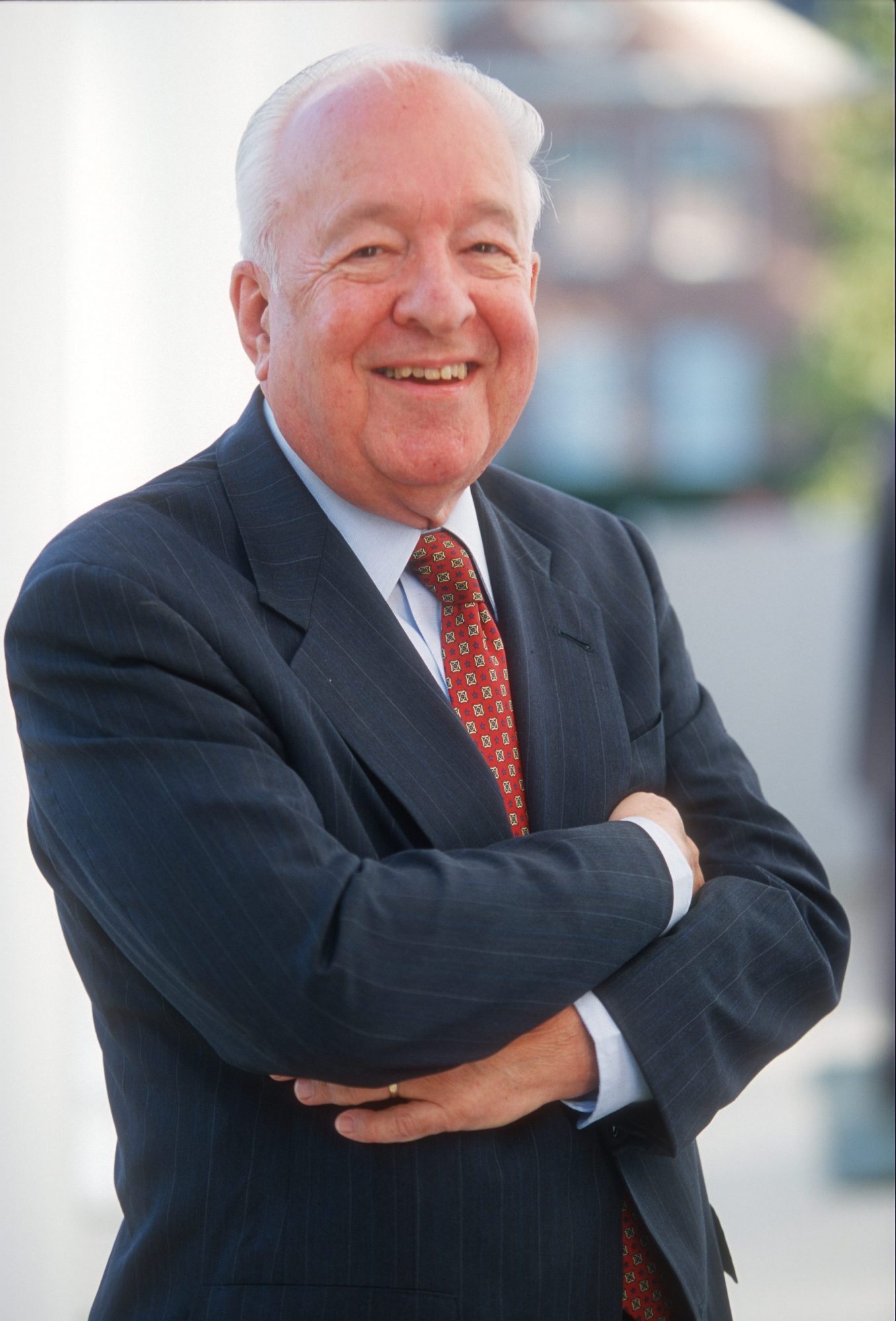
Wilson, retired Professor of English and Provost Emeritus, died on March 13, 2024 in Winston-Salem. He was 101.
He is survived by Emily Herring Wilson (MA ’62), whom he married in 1964. They had three children: Edwin G. Wilson Jr. (JD ’93), Sally Wilson (’91) and Julie Wilson. Ed and his wife, Laurie Turnage Wilson (’93, MA ’94), live in Hillsborough, N.C., with their four children: Edwin “Buddy” Wilson, III; Harry Wilson; Maria Wilson; and Eleanor Wilson. Sally and her wife, Carolyn Stevenson, live in Durham, N.C. Julie and her husband, John Steele, live in Swannanoa, N.C. Surviving in addition to his wife, children and grandchildren are generations of former students, colleagues and friends who knew and loved him.
The Wilson family is planning a memorial service on May 3, 2024, at 11 a.m., in Wait Chapel. The service will be open to the public. Additional details will be shared when they are available.
“A man of extraordinary character, grace, and wisdom, Ed Wilson has been a beloved and influential figure at Wake Forest for many decades both as a professor and an administrator,” said Wake Forest President Susan R. Wente, who met him during her first week in office. “He represented the best of Wake Forest and had a profound impact on our University, our community and our state. He has inspired generations of students to love poetry, value community and care deeply about Wake Forest.”
To be here on this day is to tell me again how much I love Wake Forest. To be at Wake Forest is to be at a place that I could love no more, and to be with people whom I could love no more.
Edwin G. Wilson (’43) spoke at an alumni luncheon on March 25, 2022 before attending Dr. Susan Wente’s inauguration.
Wilson joined the Wake Forest faculty in 1951 and served as the University’s first provost from 1967 until 1990. He continued to teach his popular course on the British Romantic poets until 1999. He served in other administrative roles until 2002, but he never really “retired,” continuing to come into his office in the Z. Smith Reynolds Library almost every day and continuing to serve as an eloquent advocate for Wake Forest’s heritage, mission and values.
“For decades he was the soul of Wake Forest and the personification of the best of Wake Forest,” said retired Senior Vice President Reid Morgan (’75, JD ’79), a longtime friend.
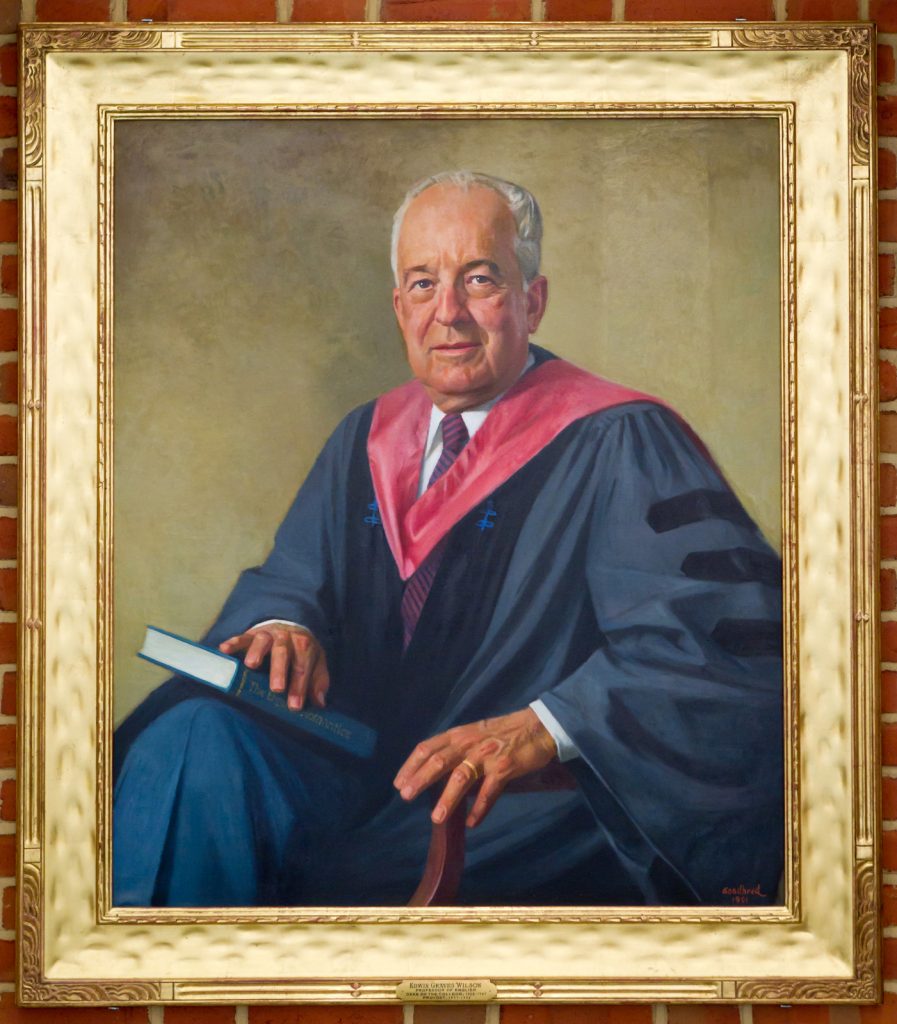
The Wilson Wing of the Z. Smith Reynolds Library was named in his honor when it was completed in 1992. He received the University’s highest award for service, the Medallion of Merit, in 2004 and was the recipient of the Distinguished Alumni Award in 1993. He was in the inaugural class of authors, journalists and poets inducted into the Wake Forest Writers Hall of Fame in 2012.
“He was teacher, eulogist, historian of Wake Forest, lover of literature and cinema, and most of all, lover of his family and his North Carolina home,” said Jeanne Whitman Bobbitt (’79, MBA ’87), a former student of Wilson’s and a current Wake Forest trustee. “At some point in every week, to this day, I say to myself, “How would Ed Wilson approach this?”
Happy to call Wake Forest “home”
Wilson, who arrived on the original campus in 1939, called the College and University home for more than 80 years, except for a few years in graduate school and the U.S. Navy. He often said that he hoped students would always find what he found when he first set foot on the original Wake Forest campus near Raleigh, N.C.: “a place which men and women of goodwill everywhere might, if they knew it, be happy to call home.”
Wilson’s personal history and Wake Forest’s institutional history are closely bound. When he wrote “The History of Wake Forest University, Volume V,” published in 2010 — chronicling the presidency of James Ralph Scales from 1967 to 1983 — he admitted that the book was both a history of the University and a memoir.
“Wake Forest has been the center of my life,” Wilson said in 2003. “Asking what I think about Wake Forest is like asking me what I think of my family.”
A native of Leaksville (now Eden), N.C., in Rockingham County, Wilson saw the Wake Forest campus for the first time when he and his parents stopped by on their way home after visiting the Outer Banks to see “The Lost Colony.”
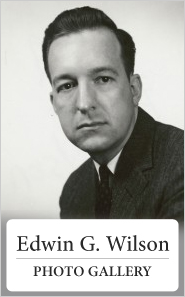
“For me — in 1939 — coming to Wake Forest, registering and going to my first classes were, in the immortal words of Humphrey Bogart in Casablanca, the ‘start of a beautiful friendship,’” Wilson said in his remarks at Founders’ Day Convocation in February 1992.
Wilson majored in English and history and distinguished himself as a scholar and campus leader. He wrote for the Old Gold & Black and was editor of the Howler yearbook his senior year and once considered a career as a “newspaper man.” He was a member of Kappa Sigma fraternity and was elected to Phi Beta Kappa and Omicron Delta Kappa.
Wilson’s two older brothers served in the U.S. Army during World War II, but he joined the Navy after graduating from Wake Forest in 1943. “I’ve always been a Romantic, and I’ve always loved stories of the sea,” he told students in Jenny Robinson Puckett’s (’71, P ’00) “History of Wake Forest” class in 2012. “I had never been in the ocean; I had never even been in a rowboat, but the idea of going into the Navy had a romantic appeal to me.”
Wilson was commissioned as an ensign and assigned to a destroyer escort in the Pacific theatre. His ship saw action in the battles of Iwo Jima and Okinawa and in the Philippines. At the end of the war, he was a lieutenant (j.g.), serving as executive officer aboard the USS Raymond.
It was an experience during a port call in Boston that charted his life’s path when he went to hear poet Robert Frost speak at Harvard. “While I was there, I walked around Harvard yard, and I said to myself, if I ever have a chance to go to graduate school, I want to come here,” he told Puckett’s students.
After being discharged from the Navy in 1946, his former English professor Broadus Jones invited him back to the original campus to teach English. He stayed one year before attending graduate school at Harvard, earning a master’s degree and a doctorate.
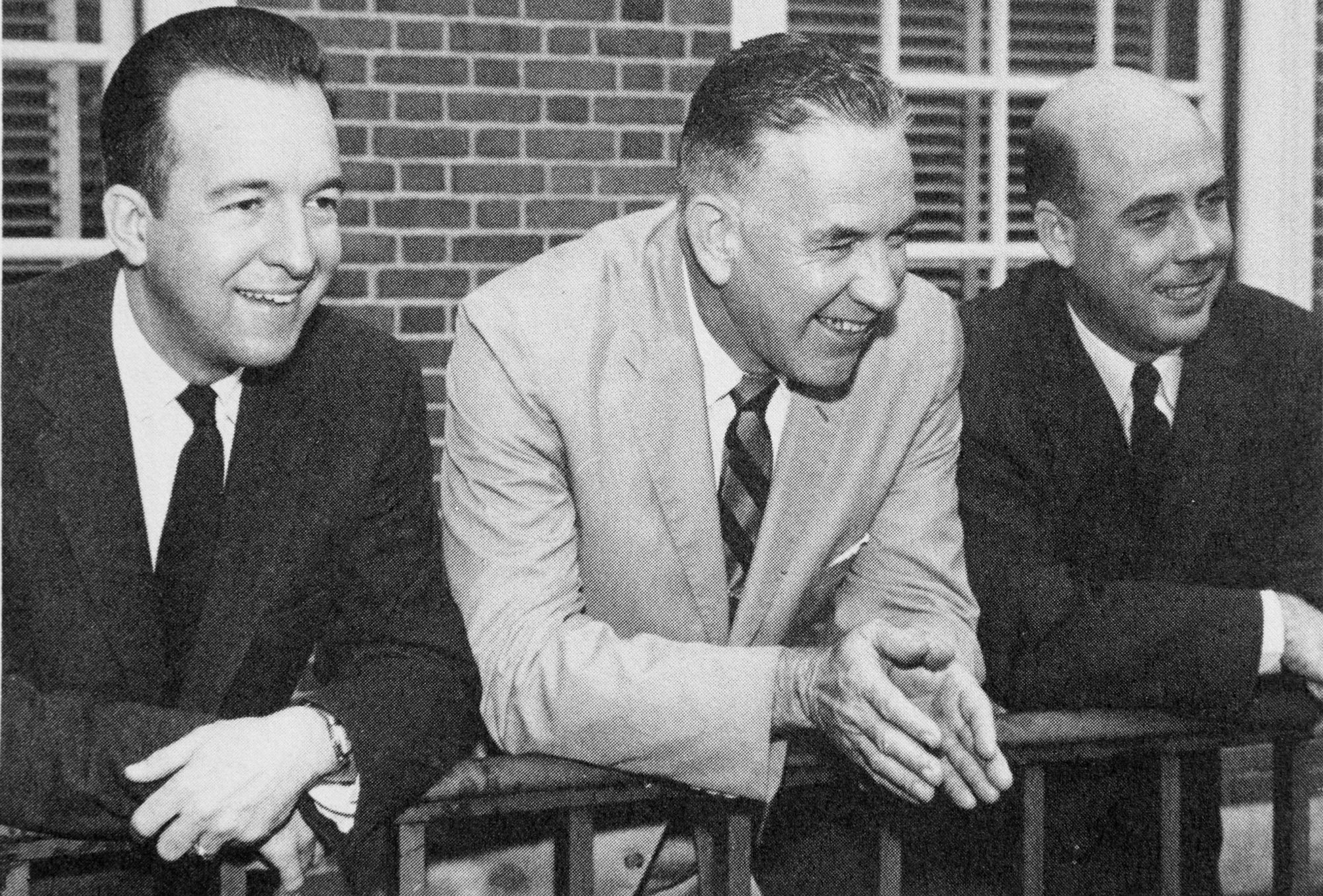
Wilson returned to Wake Forest in 1951 to teach “Poets of the English Romantic Period.” The move to the new campus was a seminal event in Wilson’s life. In the years following the move of the College from Wake Forest, N.C. to Winston Salem, Wilson, more than any other person, made sure that the spirit and personality of the College were successfully transplanted to its new home.
“Somehow I think, we — especially those of us from ‘old Wake Forest’ — felt a responsibility to transfer to Winston-Salem the same atmosphere, the same way of life, the same ‘friendliness’ that we had encountered in our own undergraduate years,” he wrote in “The History of Wake Forest University, Volume V.” “We were the last ‘Old Campus’ generation.”
Wilson was named an assistant dean under William C. Archie in 1956, the last year on the original campus. He succeeded Archie, first as acting dean in 1958, and then as dean of the college in 1960. In 1966, Esquire magazine named him one of a handful of “superprofs” in America and said that his classes in Romantic Poets and Blake, Yeats and Thomas were among the best courses in the entire country.
A former student, Marybeth Sutton Wallace (’86), remembers Wilson, before each class, “writing relevant quotes in his lively and elegant script, on the chalkboard…His teaching stirred something in our souls. And that kind of extraordinary teaching is what lies at the heart of Wake Forest.”
A man of many firsts
In the early 1960s, Wilson supported integrating the College. Ed Reynolds (’64), from Ghana, enrolled as the College’s first Black student in 1962.
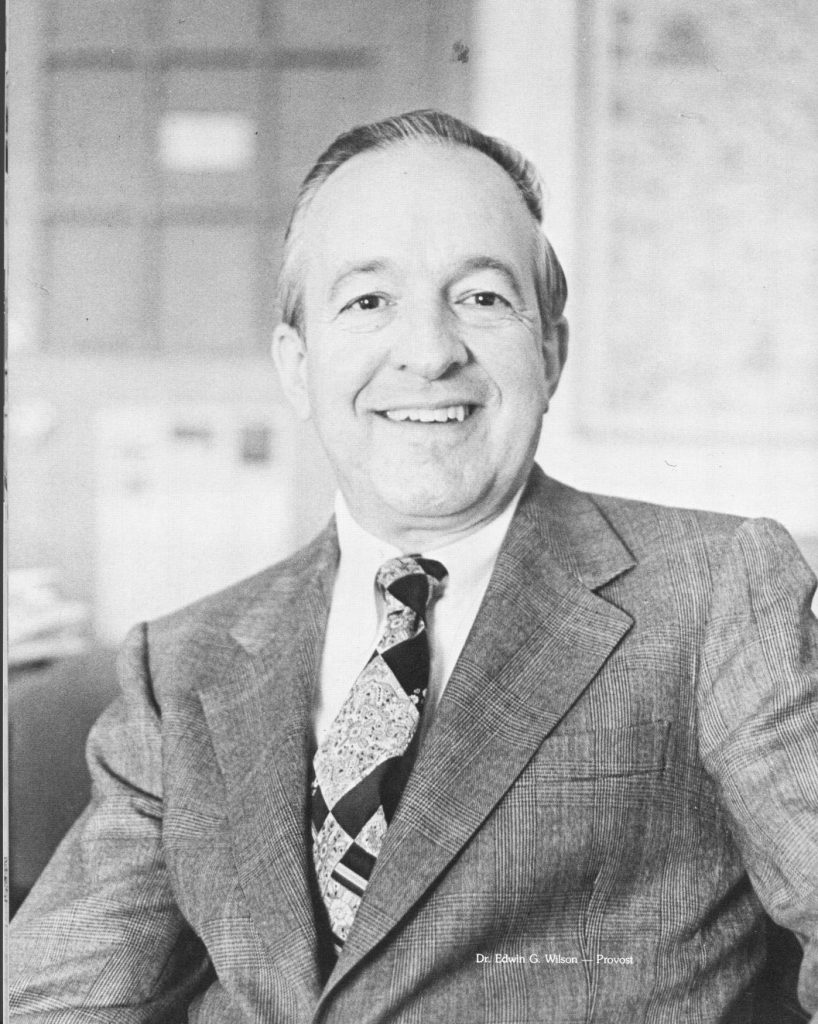
President James Ralph Scales named Wilson the University’s first provost in 1967. He served in that role throughout Scales’ 16 years as president and for the first part of the tenure of Thomas K. Hearn Jr. As the University’s chief academic officer, he shaped the academic curriculum, programs and faculty at a time when Wake Forest was growing in national prestige.
He helped start the University’s first residential study abroad program in Venice in 1971, and a program in London in 1976. He supported the founding of the Mark H. Reece Collection of Student-Acquired Contemporary Art in the early 1960s and the founding of Wake Forest University Press in the mid-1970s, now the premier publisher of Irish poetry in North America.
“He lived out our motto Pro Humanitate each and every day, and will forever be Wake Foresters’ guiding star.”
Wake Forest Provost Michele Gillespie
After stepping down as provost in 1990, he served as vice president for special projects until 1993. He traveled around the country generating support for the University’s Heritage and Promise capital campaign. In 1998, he was called back into the administration as senior vice president. For four years, Wilson and Associate Provost Sam Gladding (’67, MAEd ’71) oversaw the duties of the Provost’s Office, with Wilson handling academic matters and Gladding administrative ones, until Bill Gordon (’68 MA ’70) was hired as Provost in 2002.
“Treasure this moment, treasure Wake Forest. To me, one of the happy facts about Wake Forest is that on that day, way back when I heard about the new school for the first time (in 1939), the two words that leaped out were ‘Wake’ and ‘Forest.’ There is something wonderful about that name, Wake Forest. It suggests waking up to life itself at its best and suggests something green and verdant that lasts as far as the years to come.”
Edwin G. Wilson (’43), reflected on his long career at Wake Forest at the alumni class representatives luncheon, March 2021.
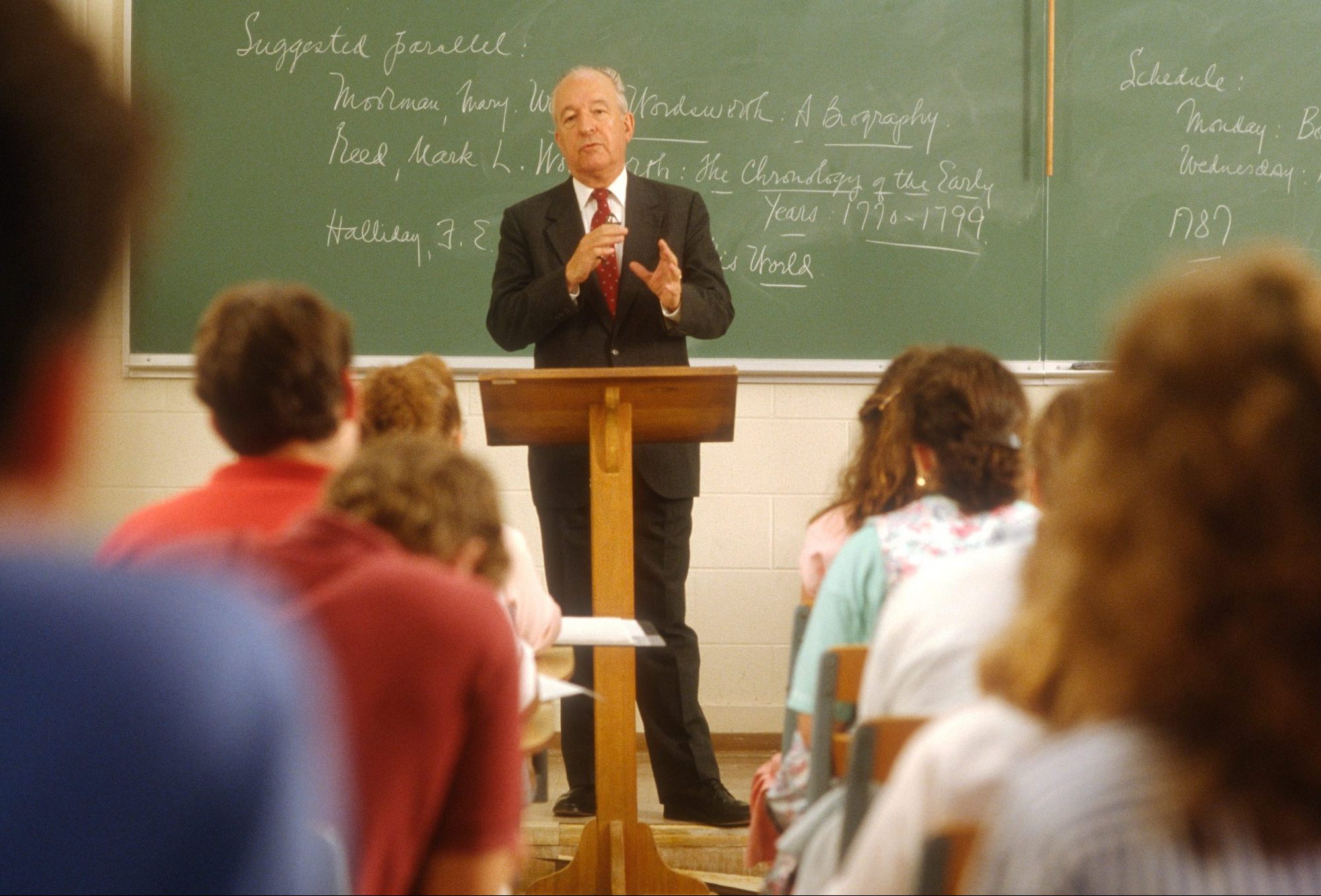
Honoring his legacy
Outside the University, Wilson served on a number of arts boards, including the Piedmont Opera Theatre, the Winston-Salem Arts Council, the North Carolina Arts Council and Reynolda House Museum of American Art. He received North Carolina’s highest civilian honor, the North Carolina Award for Public Service, in 2002. He also served as Wake Forest’s representative to the Atlantic Coast Conference and during that time served as president of the ACC.
Even after leaving his administrative duties, he never really “retired” from Wake Forest, said Sandra C. Boyette (MBA ’95), retired senior advisor to President Emeritus Nathan O. Hatch and former vice president for University Advancement. A longtime friend and colleague, Boyette had an office next door to Wilson’s in the Z. Smith Reynolds Library.
“Every day, when he came in he had 10 or 12 phone calls from alumni waiting for him to return, and a steady stream of alumni wanting to see him or dropping in to see him one after another,” Boyette said. “He had a remarkable memory for names and faces. He never tired of visiting with his former students.”
Wilson delivered hundreds of well-received speeches to alumni, parents and students during his long tenure. He delivered one of his best known speeches, “To Honor the Legacy,” at Founders’ Day Convocation in 1992, prior to the dedication of the Wilson Wing of the Z. Smith Reynolds Library.
He closed his speech by quoting from E.B. White’s classic, “Charlotte’s Web.” A dying Charlotte the spider tells Wilbur the pig: “’You have been my friend. That in itself is a tremendous thing. I wove my webs for you because I liked you.’”
“I would conclude, by saying with Charlotte, to all of you: my family, my colleagues, my students – you have been my friends. That in itself is a tremendous thing. I wove my webs for you because I liked you.”
“My hope for each graduate of the Wake Forest of our future is that he or she, if asked on Commencement Day, ‘Do you think you have learned anything?,’ will be able to say ‘I truly love what Wake Forest stands for. I have made friends, I have conducted myself with honor, I have learned, and I have been happy.”
Edwin G. Wilson (’43)
